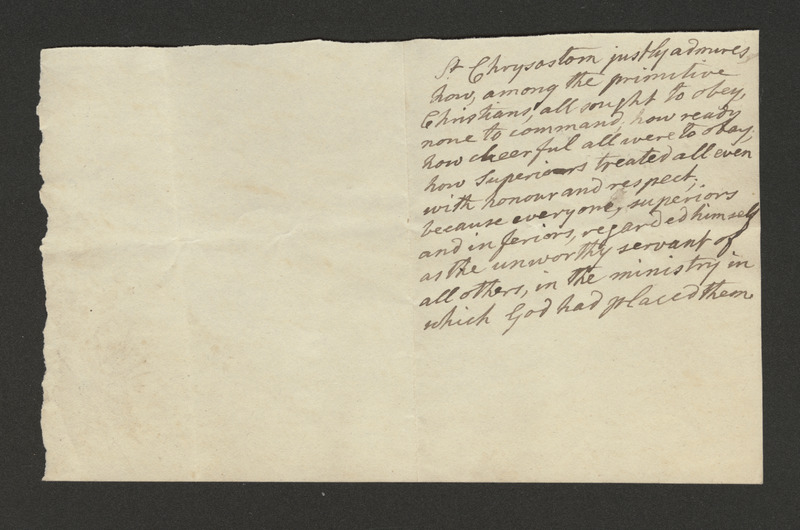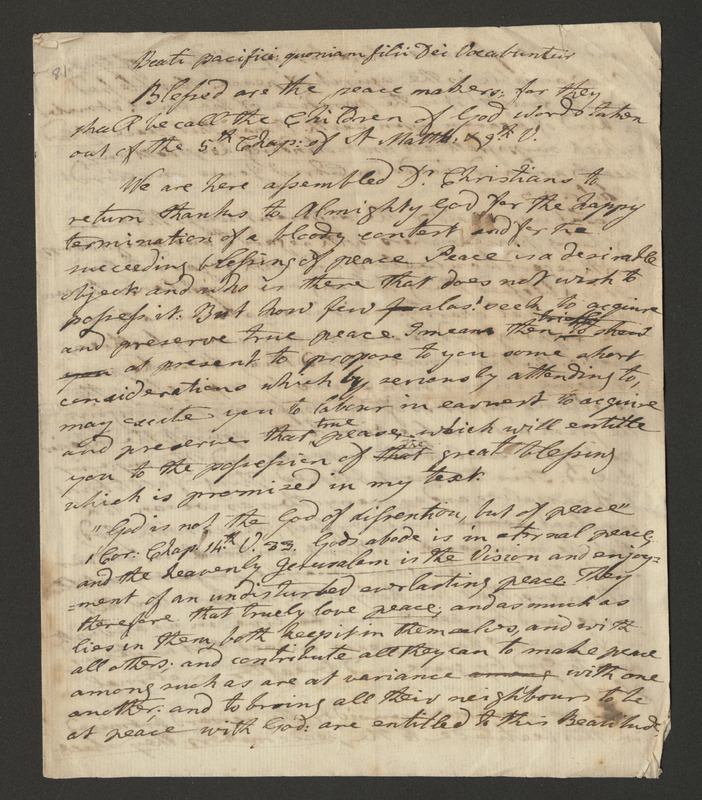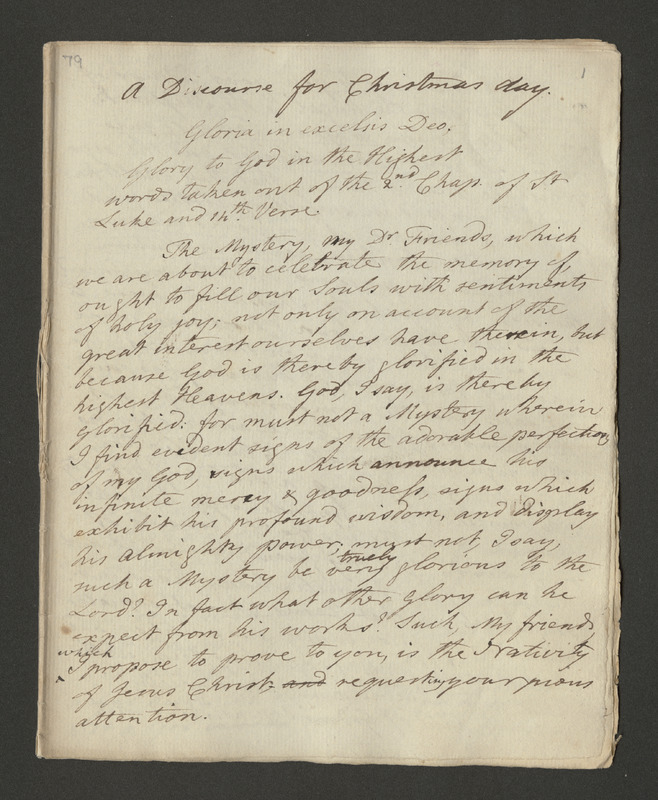Search
-
 Text
TextVon Mensche[n] Leren zu[o] meiden
Luther, Martin, 1483-1546Summary: Luther addresses the monastic rules of fasting, obedience and celibacy, arguing that they have no foundation in scripture and that a transgression of these rules is therefore no sin. At the same time, Luther warns that a transgression of monastic rules in itself is by no means a sign of faith or internalized piety. -
 Text
TextLutheri, Melanch. Carolostadii &c. Propositiones, Wittembergae uiua uoce tractatae, in hocq[ue] pleraeq[ue] aeditae ab auctoribus, ut uel nos absentes cum ipsis agamus, uel certe ut ueritatis, et seductionum admonea[n]tur boni.
Luther, Martin, 1483-1546Summary: It was the practice at Wittenberg for the students to sharpen their logical and debating skills by responding to a set of theses proposed by the professor in the discipline in which they were working. These theses were often collected into book form for the use of the students and for the study of the topics by interested non-students. This group is from the early years of the Reformation, 1521-1522. Theses proposed in the Universität Wittenberg for the granting of doctoral degrees. In most cases the "respondents" are not indicated. -
 Text
TextAin Sermon vo[n] den Hayltumb[e]n vn[d] Geziert mit Überfluss, Vo[n] hailig[e]n Creütz jn den Kirchen
Luther, Martin, 1483-1546Summary: Sermon by Martin Luther criticizing the adoration of the cross and supposed relics of the Passion. -
 Text
TextUom Missbrauch der Messen
Luther, Martin, 1483-1546Summary: Written in Latin in the fall of 1521 under the title De abroganda missa privata, this is the third printing of the first German edition of Martin Luther's important tract on the celebration of private masses. Luther opposed any celebration of the Eucharist that was not accessible to or provided for the congregation at large and felt so strongly about this material that he translated it into German himself. -
 Text
TextAin Christlyche vnd vast Wolgegrünte beweysung von dem I[u]ngsten Tag : vnd von seinen zaiche[n] das er auch nit verr meer sein mag
Luther, Martin, 1483-1546Summary: First printing of an early Advent sermon by Luther, focusing on the signs of the impending end of the world. -
 Text
TextVon der Beycht, ob die der Bapst macht habe zuo gebieten
Luther, Martin, 1483-1546Summary: Second Basel printing of an early Luther treatise on Penance, together with a translation and exposition of Psalm 118. -
 Text
TextAin Sermon von den Hayltumben vnnd gezierd mit vberfluss, Vom hailigen Creutz in den kirchen
Luther, Martin, 1483-1546Summary: A sermon by Luther admonishing the directing of one's attentions not to the wealth of the church and its relics, but to the needs of the poor. -
 Text
TextAin Sermon Secundum Matheum. [sic] : Sagt von den Phariseyern Vn[d] wie er sey mit seym Bruoder versyenen soll, Kurtzlich Geprediget. In got versamlet. De insignibus D. Saxonie 1522
Luther, Martin, 1483-1546Summary: Sermon preached July 27, 1522, on Matthew 5:20ff. (Unless your righteousness is greater than that of the Pharisees, etc,.). -
 Text
TextPrima [-Sexta] pars biblie cu[m] glosa ordinaria : expositio[n]e Lyre litterali & morali: necno[n] additio[n]ibus ac replicis.
Summary: A Vulgate Latin Bible, with the "glossa ordinaria" of Walafridus Strabo and others, the "glossa interlinearis" of Anselmus Laudunensis, the "postillae" of Nicolaus de Lyra, the "expositiones prologorum" of Guillelmus Brito, the "additiones" of Paulus Burgensis, and the "replicae" of Matthias Doring. -
 Text
TextPontificale Romanum
Catholic ChurchSummary: The Pontificale Romanum contains the liturgical rites for the sacraments of confirmation and Holy orders performed by bishops. The work is called "liber pontificalis" (pontifical or papal book) here, as books bearing pontifical authority often were prior to the 16th century, but it should not be confused with the papal annals, also called Liber Pontificalis, which is used by historians of the early Roman Church -
 Text
TextOpus restitutionum usurarum et excommunicationum
Platea, Franciscus de, -1460Summary: This work on restitution usury and excommunication by Franciscus de Platea, an Italian Franciscan, was printed nine times in the 15th century, this edition being the second. -
 Text
TextCristianus ad solitariu[m] quendam De ymagine mundi : Honorio.
Honorius, of Autun, approximately 1080-approximately 1156Summary: -
 Text
TextSacre theologiemagistri necnon sacri eloquii preconis celeberrimi fratris Roberti de Litio ordinis Minor[um] professoris op[us] quadragesimale putilissimum quod de penitentia dictum est. Feliciter incipit.
Caracciolo, Roberto, 1425-1495Summary: Includes Sermo in festo annuntiationis Virginis Marie, Sermo de predestinato numero damnatorum and Sermo de cathensis. -
 Text
TextUntitled; no verse. Concerning the loyalty of Catholics to their country
Archer, James, 1751-1834This brief piece calls attention to the words of St. Chrysostom, who admired those Christians who faithfully and honorably served where God had placed them -
 Text
TextUntitled; no verse. Concerning the loyalty of Catholics to their country
Archer, James, 1751-1834This brief piece reminds Christians to be grateful for the victories God has given them over the enemies of their countries. -
 Text
TextUntitled; Hebrews 9:27
Archer, James, 1751-1834This sermon cautions against waiting too long to turn to God, warning that there is no chance to have such a change of faith on your deathbed, rather that a life of dedication is the only way to find salvation after death. -
 Text
TextUntitled; Matthew 5:9
Archer, James, 1751-1834This sermon focuses on God as a bringer of peace, emphasizing that the Kingdom of God is one of eternal peace and that those who seek to create and bring peace to the world are the true Children of God. -
 Text
TextSermon for the 7th Sunday after Pentecost; Matthew 7:19
Archer, James, 1751-1834This sermon reminds Christians that to earn God's mercy and find salvation after death, you must actively seek out penance and work towards a life without sin. -
 Text
TextA Discourse for Christmas Day; Luke 2:14
Archer, James, 1751-1834This sermon explores the ways in which Jesus Christ exemplifies behaviors of humility and compassion as a reflection of the Glory of God.

